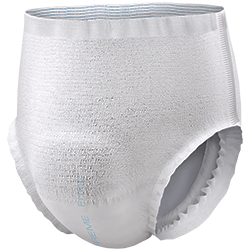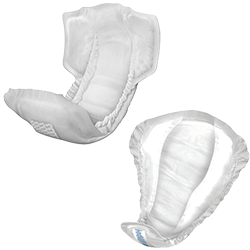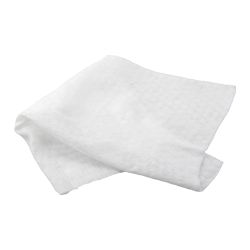Navigating Dementia and Incontinence

A caregiver’s guide to managing incontinence with dementia
Caring for a loved one with dementia is challenging – from a physical and logistical perspective, but also emotionally. Watching someone you love slowly fade away from who they once were can be extremely painful, and the steady cognitive decline that patients with dementia experience means each new day might present new challenges than the one before.
What is Dementia?
Importantly, dementia does not refer to a single disease or diagnosis. Rather, it is a kind of “umbrella” medical term used to describe a specific set of cognitive symptoms that are caused by various diseases and conditions. Generally, dementia symptoms affect cognition, memory, and behavior and get worse over time.
The most common cause of dementia is Alzheimer’s disease[1], a progressive neurodegenerative disorder that primarily affects memory and other cognitive functions. And while there is no current cure for Alzheimer’s, seeking an accurate diagnosis from a doctor is imperative to determine the stage of the disease’s progression and provide the right kind of care.
Additionally, other causes and types of dementia are treatable and even reversible if identified and addressed early, including certain metabolic disorders, nutritional deficiencies, infections, and due to the side effects of some medications.
Dementia and Incontinence
As dementia progresses, the loss of bladder or bowel control is common. For many individuals with dementia, including Alzheimer’s, incontinence results from changes in the brain that prevent a person from both recognizing they have to use the toilet and having the ability to control their bladder.
For other individuals, functional incontinence becomes the primary issue. This occurs when someone has the ability to recognize the urge to use the toilet, but they are unable to make it to a bathroom in time. For many individuals with advanced dementia, this can occur for a number of reasons, including:
-
The inability to remember where the toilet is located.
-
Mistaking something else for a toilet – often a wastebasket or closet.
-
Mobility restrictions that prevent them from physically reaching the toilet.
-
A difficulty communicating the need to use the toilet.
-
The inability to remove clothing in order to properly use the toilet.
But importantly, when it comes to caring for someone with dementia, the reason for their incontinence is less significant than how you manage it and treat the situation. As incontinence arises, the most important thing you can do is make sure your loved one feels understood, cared for, and comfortable, while minimizing embarrassment and indignity.
Best Practices and Products for Managing Incontinence and Dementia
As dementia symptoms progress, the task of providing care becomes increasingly nuanced and challenging. Mood swings, increased agitation, and personality changes are common but immensely difficult hurdles to navigate, especially when combined with increased forgetfulness around daily tasks and physical symptoms like incontinence.
Providing assistance in managing incontinence symptoms for someone with dementia can often feel like a juggling act with too many balls in the air. But, choosing the right adult diapers that protects a loved one’s dignity and prevents embarrassing accidents is an important first step.
GoSupreme Pull-On Underwear provide up to eight hours of protection from leaks and embarrassment for a full-day of comfort. And the easy pull-on style enables its wearer the opportunity to still use the toilet, if possible – a great solution for anyone whose dementia is just starting to progress beyond the early stages.
For overnight wear, we always recommend MegaMax Overnight Diaper Style Briefs. With up to 12 hours of leak-free protection, MegaMax is the ideal solution to help your loved one gets the full night’s sleep they need. While sleep is important for everyone, it becomes paramount for anyone with dementia, as a poor night’s sleep might make the next day’s dementia symptoms become worse[2].
Additionally, bed protectors (either disposable or washable) offer extra protection for furniture for occasional accidents or if your loved one with dementia becomes overly resistant to diapers.
Next, there are a number of additional steps caregivers can take to more easily manage your loved one’s incontinence and toileting.
-
Establish a firm routine and schedule for using the toilet. Set reminders to help your loved one to the bathroom after each meal, before bed, and every two hours in between.
-
Pay attention to their voiding patterns so that you can plan accordingly.
-
Make it as easy as possible for the person to find the toilet on their own. Signs with pictures can help identify the bathroom during the day, and nightlights can help them find their way if they try to find the toilet overnight.
-
Pick comfortable clothing that’s easy to clean and remove. Elastic waistbands and Velcro closures are particularly helpful.
-
Speak slowly and positively when interacting with your loved one while they attempt to use the toilet, during a diaper change, or after an accident. For many people with dementia, body language and tone of voice are just as important as words for communication purposes. Keep the mood as positive and light as possible by speaking to your loved one in a pleasant and respectful tone and use physical touch as a reassurance that everything is okay.
Often, the best way to care for someone with dementia is to try to understand the root cause for their behaviors. While it may seem impossible to fully “put yourself in their shoes,” it can help to ease the daily struggle of communicating with them and keeping them safe. Many practical strategies can be applied to make caregiving less stressful and a dementia virtual tour can offer insight on the physical and sensory experiences people with dementia live with.
Finding the right products to manage toileting and incontinence can help keep your loved one comfortable and reduce your own stress as a caregiver. Incontinence is the second-most reported reason why seniors make the move to assisted living communities or seek long-term care solutions[3]. Choosing quality adult diapers you can trust may help keep your loved one at home longer. If you have any questions or need help determining the best products to try our customer care team is happy to help! Call (800) 563-0161 or email us anytime, or you can learn more about our sample program online.
This content is not intended to be a substitute for professional medical advice, diagnosis or treatment. Always seek the advice of a physician or other qualified healthcare provider with any questions you may have regarding a medical condition.
[1] https://www.alzheimers.gov/alzheimers-dementias/alzheimers-disease
[2] https://www.alzheimers.org.uk/about-dementia/symptoms-and-diagnosis/sleep
[3] https://www.aplaceformom.com/caregiver-resources/articles/incontinence-care-assisted-living
Products Mentioned in this Article
Starting at $13.99
FSA/HSA Eligible
Starting at $8.99
FSA/HSA Eligible
Starting at $7.50
FSA/HSA Eligible
Starting at $24.99
FSA/HSA Eligible













